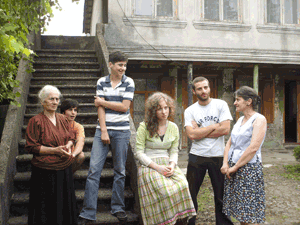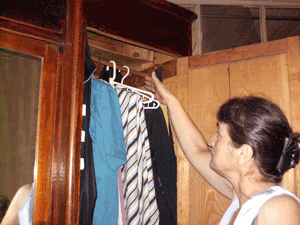 Nana Pazhava, Zugdidi
Nana Pazhava, Zugdidi
The information about upcoming arrests was spread about during the period of martial law in Georgia. The list of 16 persons that might be arrested has been actively discussed. Assumedly, these 16 persons were somehow connected with Russian generals, Russian soldiers or Abkhaz authorities before and after August 8, 2008 when the military activities first started in Georgia.
Vano Merabishvili, Minister of Internal Affairs of Georgia talked about the connections between some people in Georgia and Russian- Abkhazian side. He indirectly indicated to Samegrelo region. The Minister talked about the fact of accompanying Russians when they occupied Georgian territories. However, no one has been charged for escorting Russian militaries till now. At this time it is difficult to distinguish between the real aims of the police when they when they went about arresting people under charges of illegal drug or weapon possession.
On August 27 the representatives of Samegrelo-Zemo Svaneti Regional Police arrested Kakha Kitia, near the Human Rights Center’s Samegrelo Office. The eyewitnesses say that the special operation that took him into detention of was on such a massive scale that people were even coming out of their houses to see what was going on. However, curious and courageous people did not stand back and started using foul language against the police officers.
The eyewitnesses say that about 30 police officers including patrol police representatives blocked Kaka Kitia’s road at the crossing of Gamsakhurdia and Tavisupleba Streets. Kitia was driving in a jeep and how he was dragged out of the car and then beaten. The police officers beat Kitia with fists and legs. Kokhta Kodua, a police officer was very active. The detainee was shouting, what are you doing? Do you want to plant drugs on me? Apparently, Kitia noticed that the police threw a package in his car and he threw it outside immediately. The police dropped Kitia on the ground and started beating him up. Several police officers went about were kicking him. Kitia was calling out to people for help. However, his attempt was in vain as the police would not let us get any closer. We also witnessed that the police brought two men and made them sign some papers. I think they served as witnesses to the detention operation.”
It turned out later that the police found drugs and a gun in Kakha Kitia’s car saloon. The Zugdidi District Court sentenced Kitia to preliminary detention for a period of two months.
Kitia’s attorney states that Kitia’s entire body was covered with bruises following the brutal detention operation. Assumedly, his ribs were broken and suffered an injury to his skull. Kitia’s attorney appealed to the court for conducting forensic expertise. However, the attorney’s appeal was not honored. The potential convict was moved to Kutaisi Prison in stead of being held in Zugdidi Hospital #4, which would appear not to be logical considering how serious were his injuries.
Neither Kitia’s attorney nor his family members talk about the real reasons for Kitia’s arrest. There is unofficial information that Kitia was connected with Russian soldiers and Abkhaz criminals and this might serve as the reason arresting Kitia for high treason. Kitia was a co-owner of petrol station chain of Ulevi, possessed several trade units in Zugdidi and had a pretty good share in the scrap metal business.
According to one allegation when fuel reserve was over in Ulevi chain, Kitia decided to fill the deficit via the Russian army. Allegedly Kitia bought 30 tones of petrol from Russian military forces and he sold it in Samegrelo at its real price without raising the cost. Allegations on Kitia’s involvement with Abkhaz criminals or so called “boeviks” might be connected with Kitia’s scrap metal business. However, it must be noted that the trucks loaded with scrap metal moved from Abkhazia to Zugdidi and this was outside of the permission of Georgian authorities.
The police arrested Demna Antia, a man who has nothing to do with the business but was the member of Conservative Party for illegal weapon purchase and possession. The police found Antia’s weapon in his house.
Darejan Kobalia, Antia’s wife: “They broke into our house at 5 o’clock in the morning. They took all seven members of the family out into his to the yard. There were about 20 police officers. They arrived in 6 cars. Lasha Kobalia, investigator told us that they had information that weapon was being kept in our house and they had to search the house. Everything they said was so unimaginable that we had been resisting the police for half an hour. Irakli Jobava and Giorgi Samushia, police officers were rather aggressive. Then they called our neighbors for attending the search operation, as they proceeded to make a mess of the entire house….”
When the search was over, Demur Antia himself indicated to the police the room they had forgotten to search. Consequently, the police found AKS system automatic and 30 cartridges in the children’s wardrobe; the weapons’ serial number had been filed.
Darejan Kobalia: “When they opened the wardrobe, an automat fell from the upper shelf. We as well as the children were shocked and stunned. Demur was shouting how you dare plant weapon in my children’s wardrobe. One of the police officers ordered us to calm down and said that he had been a member of Mkhedrioni (a paramilitary organization at the beginning of 1990s), and such; a person is capable of doing everything.
fell from the upper shelf. We as well as the children were shocked and stunned. Demur was shouting how you dare plant weapon in my children’s wardrobe. One of the police officers ordered us to calm down and said that he had been a member of Mkhedrioni (a paramilitary organization at the beginning of 1990s), and such; a person is capable of doing everything.
Temur Kardava, attorney: “The search was conducted under the cloud of severe law violations. The police kept the family in one room while they moved in the house for half an hour. This raises serious suspects that the police might plant the weapon. It is strange that the police attributed the weapon particularly to Demur Antia and not to any other from Demur’s family, which totals seven members in all. No fingerprint analysis was conducted of the discovered weapon. The motive for rejecting my appeal for bail was rather annoying. It is indicated in Nato Akobia’s judgment who was the chief judge on this case that “even though Antia was accused of conducting a minor offence, he did not cooperate with the investigation” and therefore, the court would not satisfy my motion…. I consider that this is an example of political persecution!”
Demur Antia’s family members also consider that Antia was arrested due to his political activity. They call the allegations on Antia’s connections with Russian generals as totally absurd. Konstantine, Demur Antia’s older son states that his father met the head of UN Mission to Georgia and not with a Russian general.
Konstantine Antia: “My father is 60 years old and he had never taken a gun in his hand. He is very religious… Our Abkhaz IDP neighbors have a relative in Moscow. She informed them about possible invasion of Russian-Abkhazian forces in Zugdidi and warned there might be looting. The Akbhazians warned their neighbors. My father went to the office of local government to inform them about the allegation. However, he could not find any authorities. They had disappeared and the police was disarmed and scattered. Then he decided to go to the UN Zugdidi Office. He met Claiv Trot, the head of the office and demanded that the UN try to deal with the threats and protected the local population. Trot called Sergey Chaban, the Russian general in front of my father. Chaban said denied the information and called for everybody to remain calm.”



